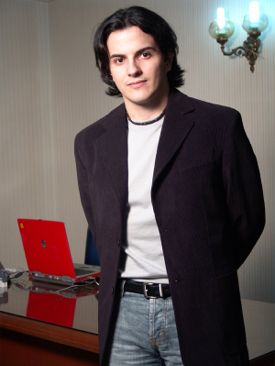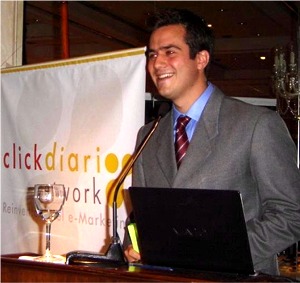|
“My parents always put books
in front of us, telling us how important it was to "learn
how to learn,”
de Tezanos said. “That has been the differentiator in my life in
school as well as with the companies that I have started.” That
never ending thirst for knowledge is a theme you will see running
throughout de Tezano’s story.
While
his parents put a premium on learning they put an even higher value
on loving
what you do.
De Tezanos said, “My father lives life with such contagious joy! He
loves math and can solve very complex mathematical problems without
a calculator! I remember in high school I was afraid to tell him
if I didn’t understand that day's math lesson because he would get
excited and try to explain the subject in such a complex way. He
would say "all
of the world around us is
mathematics!”
His life had been a blur since that fateful
day in 1999 when de Tezanos decided to forget dentistry and drop out
of school. The seeds that led to that decision were actually sown
four years earlier when he was first introduced to the Internet.
It
happened in 1995 when he went to Uruguay to visit Santiago
de Tezanos
(a half-brother from his father’s first marriage). As an
architect, Santiago was one of a handful of professionals who were
among the very first users on the Internet in South
America.
"At that time the Internet was all plain text and the computers
were primitive, but he had a 14.4 kbps modem and could chat on the IRC,”
Matías recalled. “I was shocked!
It amazed me that I could talk with someone over the computer and
like magic see the letters appear on the screen, as if a ghost was
typing them!
“Then
I visited my first web page, Yahoo!,
and the first thing I thought of was how
is this page built?"
I asked my brother and he said "I don’t know, but you
can find out by searching the Internet." At that
moment, I had a flashback, remembering what my parents
had told us for so many years, "learn
how to learn!"
So I started doing research on how to build websites.”
De
Tezanos
went back to Guatemala, got his own computer and raced home
to do research on it every day after school. He soon had
learned enough to develop websites and started selling his
services to local businesses. “That’s how I made some
good money while I was still in high school!,” de Tezanos
said. “I was one of the first Internet users in Guatemala
City
and back then there were very, very few.”
Also
at that time, when a young man completed a distinguished high school
career, certain things were expected of him. “When I finished high
school in 1997 I knew I had to go to the university to study.
That’s what the "system" tells everyone, so I went
along,” de Tezanos said. “I had this pressure that my
father was a great professional so I had
to be one as well. I didn’t know what to study, but finally
settled on dentistry as it was a respected profession.”
So
off he went to college and for two years it looked like he had all
of the makings of an excellent dentist. “I did very well and was
ranked 6th among 200 students. I liked the books and I
liked to read so
much but I knew deep inside that what I really liked was the Internet,
so in October 1999 I quit,” de Tezanos said. As you can imagine,
this was not the easiest news to deliver to his family.
“I
remember going to my father’s office and I was so
nervous about how mad he would be when I told him I wanted to quit
studying dentistry so I could study the Internet!,” de Tezanos
said. “His answer amazed
me. He told me that he was proud of me and that I had to do with my
life whatever my heart and mind told me would make me most happy.
The very next day, I started a web design company with two friends
and it quickly became recognized as the best one in Central America.
We provided web development services, created brands and gave advice
on web security (since we had all learned a little bit about
hacking).”
|

Rick
Schwartz
T.R.A.F.F.I.C. Co-Founder |
One
of the new company’s first clients was Rick
Schwartz
(the co-founder of the T.R.A.F.F.I.C.
conferences who is widely known today as the Domain King). “Back
in 1999, when I started doing research about the Internet, I
ended up at his site eRealEstate.com. I
learned a lot about the domain name industry
from Rick, who kindly took the time to chat with me for a
couple of hours. I learned a lot of things from him I
didn’t know about domains, things that ended up triggering
what I did next. My partners and I wound up developing a
flash presentation for eRealEstate.com after that
encounter,” de Tezanos said.
One
thing that de Tezanos immediately noticed was how quickly
things can change on the web. “Time flys
on the Internet! A company can grow more in three months in
this industry than in a year anywhere else,” de Tezanos
said. “After four months with my first company I had
learned about Internet advertising and wanted to get into
that space, but my partners didn’t like the idea. So
I decided to leave the company and start a new one. My
original partners were and still are great
entrepreneurs and they also did well in the end.” |
As
de Tezanos delved deeper into online advertising his research
brought him into contact with his current partner, Julio
Gonzalez.
“Julio was working in one of the most important banks in Central
America, developing all of their Internet banking strategy,”
de Tezanos said. “We set up a meeting at a local Burger
King.
That’s where we decided to join forces and start a new company.
The ClickDiario Network was born at that Burger King and we had no
idea what kind of monster we were creating!
De
Tezanos
dreamed of being one of those guys who ran the kind of Internet
companies that were being featured on all of the cable TV business
shows in 2000. They had at least 50 employees, offices in glamorous
cities, lots of traffic and were being courted by big corporations.
But to make his dream come true he figured his company was going to
need some seed money. He decided the place to get it would be the
Land of Opportunity – America.
De
Tezanos took the little bit of money he had in his bank account and
bought a ticket to Miami,
landing with about $300
in his pocket and plans for executing his dream scribbled on two
pieces of paper. He picked a half dozen companies he thought might
be interested in putting money into his project. “Two of them were
“incubators” and four were “investors" (today I can tell
you they were actually bankers – not investors – and there’s a
big difference!),” de Tezanos said.
“All
of the meetings where the same, telling people about our
project, how we can grow it and the money we needed to grow.
At that time, to be honest, I didn’t even know what a
business plan was, or what an information memorandum was, or
what profitability meant! Funny, but today all
those words are part of my day to day job."
"After
four days in the U.S.
and
all of those meetings, I received only one offer. This
incubator company offered to bring us to Miami to work with
them, but they would take 60% of our company and make us
just a part of their team, developing all of their projects
as well. It was a honorable offer, but I didn’t like
it, and when I told Julio about it he didn’t like it
either, so we decided to keep working on our
own,” de Tezanos said.
”Still,
I took so much from that trip, the best part being that there was
this HUGE
world full of people and that someday some of them would be
interested in my company under my
conditions! With this thought in my head, I focused on developing
ClickDiario until instead of a dream, we had a company. To do that,
I had to become a real CEO
and that takes a lot of charisma, education, preparation, reading,
positivism and being humble but at the same time aggressive (in
a good way). The most important part of being a CEO was to build
a great network of peers that would help us maximize things
when we were doing great and help us fix problems
when we where having the worst days of our lives.”
The
pair started working from home and decided their first project would
be to build up a humor site that Julio had started a couple of years
earlier at LoPeor.com
(“TheWorst.com” in Spanish). People were already visiting the
site and since de Tezanos had done research on profiting from
traffic he knew how to make money from those visitors. “I landed a
couple of contracts with ad networks and we started making money
from day
one.
Three months later we had our own office, three months after that we
had five employees and in another three months we were able to start
buying more generic keyword .coms;
the Spanish language equivalents of health, sports, postcards and
diets to name just a few.”
Their
first big purchase was Tarjetas.com
which they bought from a domain owner in Argentina.
“It means "cards.com" in Spanish and is the
name we use for “greeting cards”. The domain was receiving
thousands of visitors a day. Using what I learned from
developing web sites for other companies we were able to add good
content and grow the traffic even more, making it a big success,”
de Tezanos said.
“That
worked out so well, I started contacting almost all of the owners of
top generic Spanish domain names. I knew we were in a race against
time to get the best domains. I won some races and lost some. I
wanted to buy ALL
of the great domains in Spanish, build them and make them so good
users would want to come back. With them referring other users to
our sites I knew traffic would grow and we could make money from
selling online advertising,” de Tezanos said.
2000
was an incredible year for them. The only downside was that 2001
came next. We all know what happened then. The bubble burst and
suddenly online business was out of fashion. In the investment and
advertising communities, Internet companies were about as welcome as
bird flu. “In 2001 the market cooled down so much that we had our
contracts canceled by the ad networks, as did just about everyone
else at that time,” de Tezanos said. “We had two options, work
harder, or close. We chose to continue working."
“I
was in charge of the business development side of the
company, so it was my job to go out there and find the
advertisers who provided our main revenue stream. I
think the key element to our survival through the downturn
in 2001 and 2002 was that we love what we do so much."
"It
is one of the very few industries where any 19-year-old
kid from a 3rd world country with a 14.4 modem and the
will to create something can make their dreams come true!
I try to pass this feeling on to everyone on my team every
day. I’m a true believer that with that feeling
amazing things can be done at every level,” de Tezanos
said.
They
managed to keep the doors open and in hindsight de Tezanos thinks
that everything that happened was for the best. Events during the
dark days taught him valuable lessons and brought him into contact
with people who were later instrumental in reaching his ultimate
goal. “Even though so many things changed during this adventure,
the goal I had from the beginning, having this big network of sites,
came true. After five years of hard work, a great partner, a great
team, determination, faith, good karma (helping my peers
and them helping me), a great network and passion, the dream came
true. So I think all
of the past five years have been golden years in different ways.”
Things
started to rebound in 2003 and now, after those humble beginnings in
a booth at Burger King, ClickDiario has grown into a massive network
that reaches an estimated 50% of Spanish speaking Internet users
worldwide. They have sales offices in Miami,
Mexico
City,
Buenos
Aires
and Guatemala
City.
Their network welcomes 4 million visitors a day, delivers 1 billion
ad impressions each month and has over 10 million opt in
subscribers.
The
scary thing is that is just a drop in the bucket compared to what is
expected to come. “Spending on Internet advertising isn’t even
1% of the overall advertising budget in our region, so we have huge
growth potential,” de Tezanos said. Though
he sold the company, De Tezanos says "we" because he
remains in charge of ClickDiario. The only difference is that the
company he co-founded is now a wholly owned subsidiary of LiveDoor.
“My
dream now is that ClickDiario will become one of the big media groups in
the Spanish speaking world, at the same level as the big TV, newspaper
and radio media groups that inform and influence in a good way what
people read, watch, surf, learn and shop for. Also, letting people
be the media communicators by providing them platforms to do it, which
I believe is the road the Internet world is taking.”
De
Tezanos believes that his Central American base gives him a big
advantage because he can see what is coming to his region in
advance
by watching developments in the “first world” countries. “I
have always seen Latin America as the tail of developed countries.
Almost all of the trends that become big in developed countries
become big in our region two or three years later.”
“The
Hispanic market is now growing faster than the English speaking
market,” de Tezanos said. “There are an estimated 90 million Internet
users that speak and surf in Spanish. It’s great for any company
that knows the formula for building sites because they are perfectly
positioned to take advantage of this growth."
|
One
example de Tezanos points to is Chena
Ventures,
owned by another well-known young developer in the Hispanic
market, Paraguay’s
Chris Chena
(who was featured in our July 2005 Cover
Story).
“Chris is a great entrepreneur,” de Tezanos said. “We
chat almost every day and I have learned many
things from him, in fact, I think no one that knows him
will ever stop learning from him.” Considering that the
two of them compete for the same prime Spanish language .com
keywords you might think Chena and de Tezanos would be
natural rivals rather than close friends but that is not the
case.
“I
don’t think we compete, on the contrary, I think
Chris is in a unique situation today,” de Tezanos
said. “The ClickDiario sale to Livedoor set a benchmark in
the Spanish speaking Internet industry. It’s the
first acquisition since the Internet boom in 2000 of a 100%
Spanish Internet advertising company. That opens a
window of opportunity for all the owners of Internet
projects targeting the Spanish speaking world. Chris has
built a powerful and promising network of sites which
I’m sure would be a great asset for any big media group
out there.” |

Chris
Chena
President, Chena
Ventures Inc. |
"As
with other domainers, we have competed for a couple of domains and
it’s fun. As I mentioned before, we win some races and we
lose some. If you never lose, you don’t know the real
feeling of winning. I have said this to all of our
"competitors" and I will say it again; I think there is
enough room for everyone in this industry and the more we work
together, the more we will make our industry grow and this will
cause our profits to grow. Who wouldn’t like that!?”
de Tazanos said.
There’s
no doubt the Hispanic market is a large pie and one that gets
bigger every year. A lot of companies from the U.S., Europe and Asia
are starting to promote their services in Spanish including Verizon,
Hotels.com,
Toyota
and
many other brands. This has not gone unnoticed by the global
companies that cater to those multi-national advertisers. Livedoor
is a prime example. Their acquisition of ClickDiario was part of
their strategy of growing and growing fast.
“At
the end of the day, strategy is destiny,” de Tezanos said. “The
success or failure of a company in reaching it goals is based on its
strategy and execution (this is why the management team and learning
how to manage a team is so important). Part of a good strategy
is identifying a growing market. Livedoor saw this potential in
ClickDiario and in the Spanish speaking world. We are convinced we
are just scratching the surface of what will become a huge market in
the next few years so we are very excited!”
With
so much potential in a space he knows so well, the obvious
question is why would de Tezanos sell now?
“Companies grow, and as they grow there comes a time where
you have to accept that the "dreamer" who
invented the company is no longer the best pilot to
drive it," de Tezanos said. Also it is a tough job
to keep dreaming up new ideas for continued growth and at
the same time try to manage a company."
“It’s
a fact that every entrepreneur has to face sooner or
later. We always want growth but at the same time we want to
try new things and have a "fun" company culture.
In LiveDoor we found a similar company culture. Now, as a
wholly owned LiveDoor subsidiary we not only search to grow
our business but also to grow the opportunities for our
staff, which we believe is a great staff and we want the
best for them as well. We are sure that LiveDoor was the
best partner for all of us and for the business.”
Another
thing de Tezanos likes about the LiveDoor connection is their plan
to keep him on the road. Traveling happens to be one of the loves of
his life. “When we started ClickDiario we traveled about once
every three months on business. Then it became once a month and last
year we were on the road almost every week! We visited ad agencies
around the region "teaching" them what the Internet was
all about and how it could help their business and strengthen their
brands,” de Tezanos said.
“I
remember my first business trip. It really blew my mind realizing
how many people you could meet, how many ideas you could come up
with from just having a business lunch with a stranger, how
many different things you could learn from different cultures and
how all this learning could be applied to growing a business or
enjoying life in a much better way. In other words, having fun while
we live and get rewarded in all kind of ways! Since then, every
time I can, I travel and I use every minute available when I am on
the road. I consider watching TV in a hotel room a waste of time
when I could be having coffee with someone from a cool company and
learn more about what they do,” de Tezanos said.
While
de Tezanos has enjoyed the great camaraderie in the domain industry,
he also knows there are two separate camps when it comes to the
question of whether it is better to put in the work needed to
develop domains or skip the workload and earn your revenue from pay
per click (PPC)
services. De Tezanos is a ringleader of the development group. “I
like to buy a domain name and make it a profitable site.
It’s like finding a perfect piece of land and using it to build a beautiful
house or a cool store or a big building.”
“If
the domain name has traffic because it is a popular generic word it
is like land in a high traffic area where ideal customers are always
passing by. For example, if you have Business.com,
I compare it to buying land in the Wall
Street area,
if you have Fashion.com
it is like having land on 5th
Avenue
and if you buy Health.com
it’s like owning land next to a hospital. You can build a house or
a building or a hospital or a store depending on what type of land
you own.”
“It
is true that some domains will earn more money by renting the
traffic, either
to a specific client or to the PPC
industry. However, some domains will make far more money if you
develop them. For example, in 2003 we bought Deportes.com
(Sports.com in Spanish) then spent $30,000
on development
and three months selling sponsorships. We were able to recover our entire
investment in the first 12 months,” de Tezanos said.
"My
experience has been that it depends on the industry and the
structure you create around it. For example, at
ClickDiario, we have a structure where we have a regional
sales force, dozens of servers , great technology, traffic,
programmers, designers, content generators, auditors,
lawyers, etc. So if we buy a domain name we know we have the
structure to build it fast, inject traffic, find a sponsor
and make it profitable,” de Tezanos said.
“It
took hard work to get where we are now and it has been a
long learning curve, but we have managed to make almost all
of our domain names into profitable portals. We haven't
succeeded with all of them, but I would say 90% are success
stories. We are still learning. I’m sure we will never
stop learning!”
That’s
undoubtedly true, but it seems de Tezanos has already learned the
most important thing in life. “Leaving aside all the business we
can do and all the success we can achieve as entrepreneurs, I
like to always remember why we are here. Having fun, working
hard and making history are just as important, and all of
you that have time to spend with the people you love and
admire should feel the most rewarded!”
“I
admire everyone that has a story to tell that will impact people's
lives in a good way, regardless of the subject. I’m not telling
this story to let people know I exist, or how well I have done,"
de Tezanos said, "I’m telling it because I will never forget
that reading other people's stories made me start dreaming and
showed me that my dreams could
come true, dreams that became life changing events for me and the
people that surround me. I think telling this story is a way of
paying back and I really hope this story has the same
impact on a couple of your readers, so they will be motivated
to create good life changing situations for themselves and the
people around them.”
In
closing De Tezanos said, “I admire all the people that
live their life every day as if that is the only
day they have to live, the people that scream how happy
they are without being afraid to say it, the people that
enter a room and say hello with a big smile, the people that
tell their loved ones how much they love them EVERY
day, the people that fight for their dreams because they
truly believe we all can create the same opportunities in
our lives, so
fight for your dreams, and try to have fun doing it!”
*****
|
















